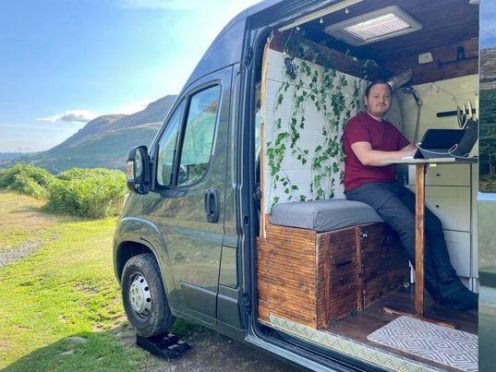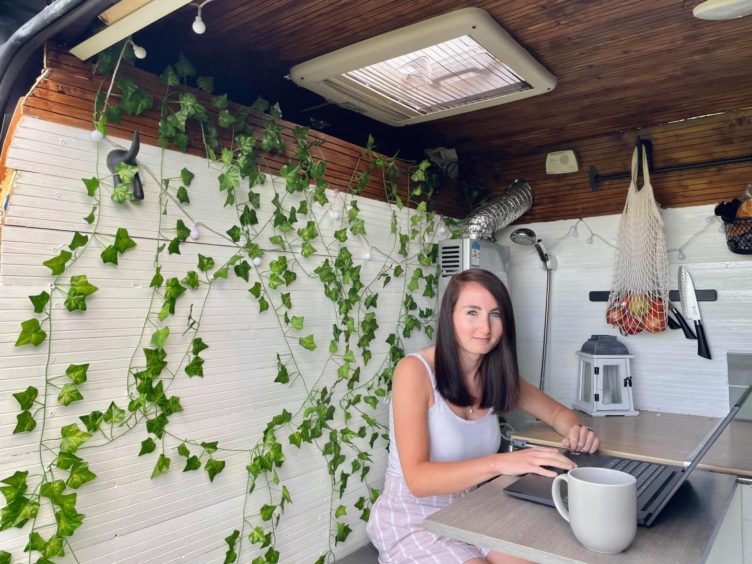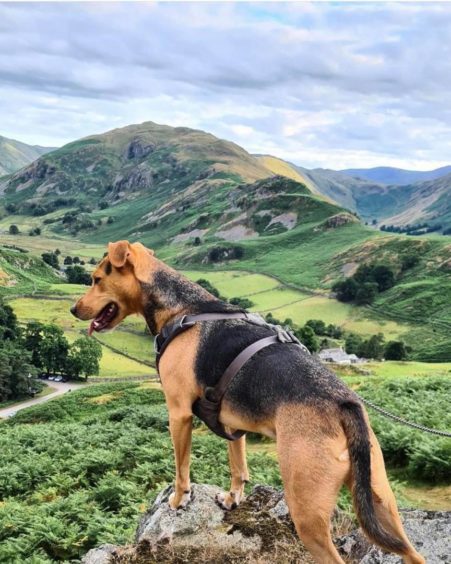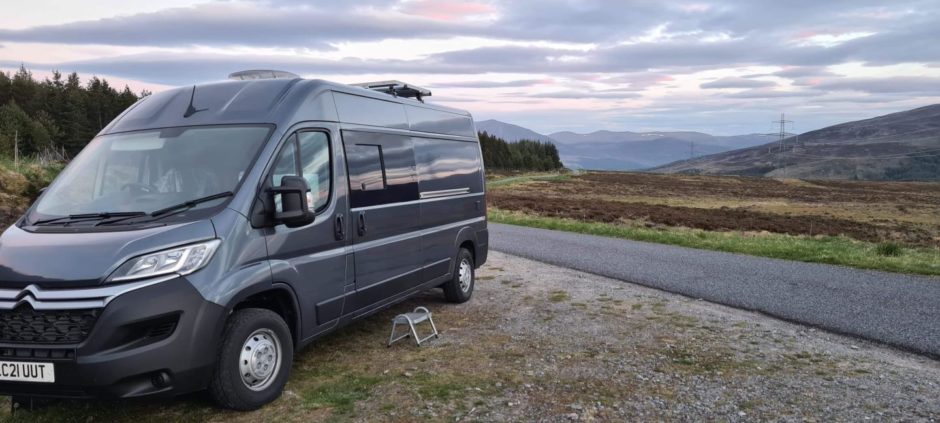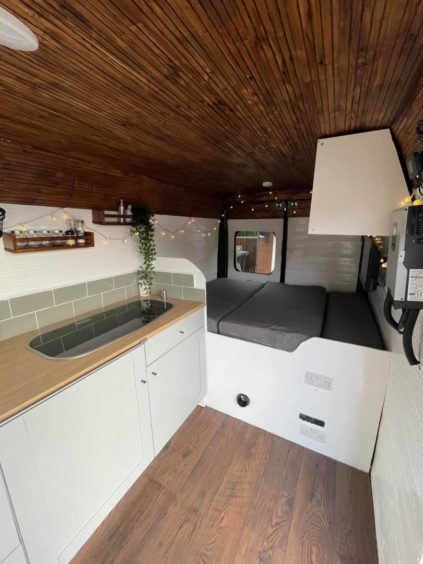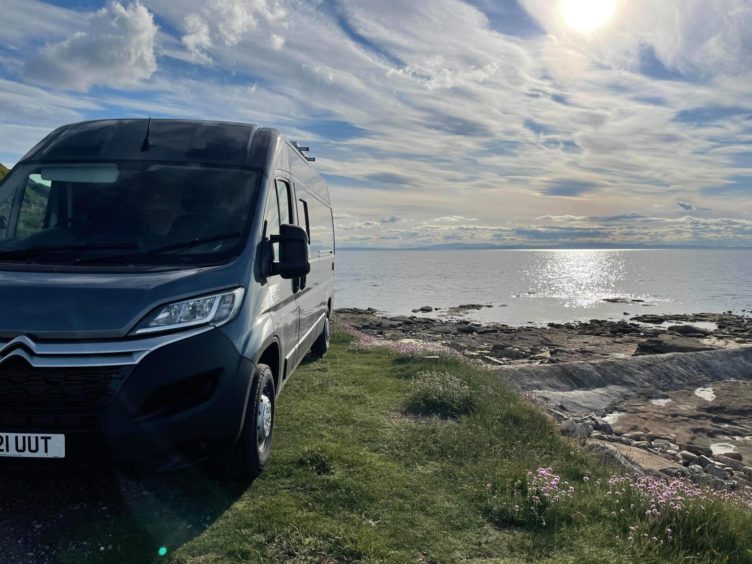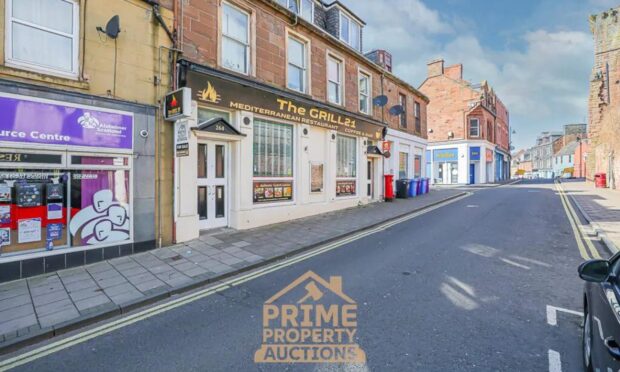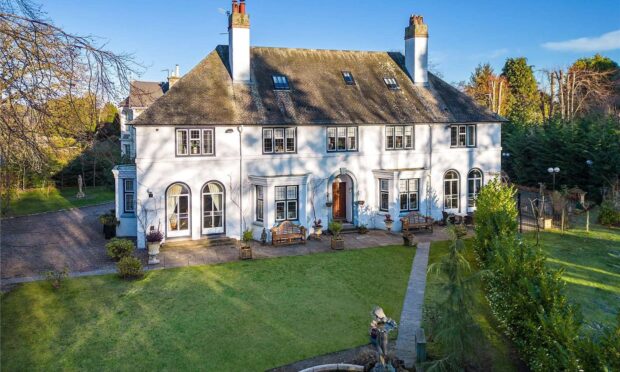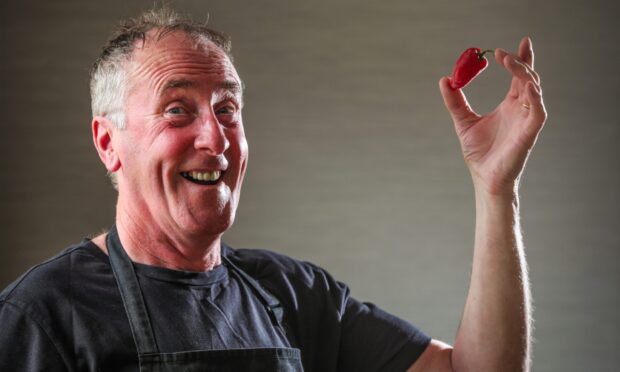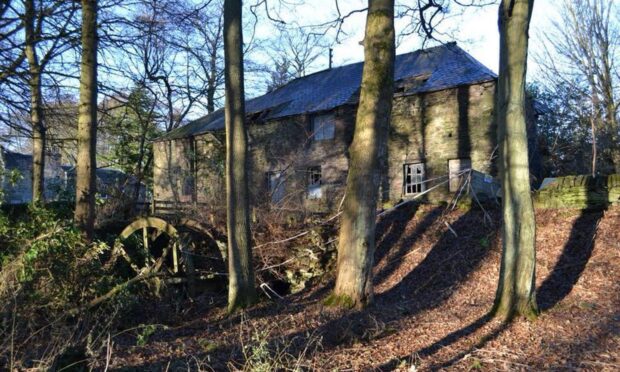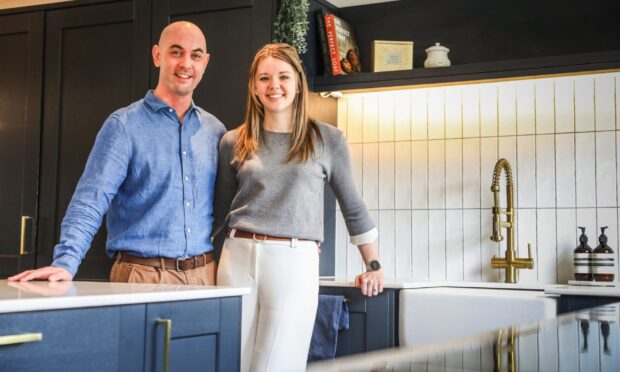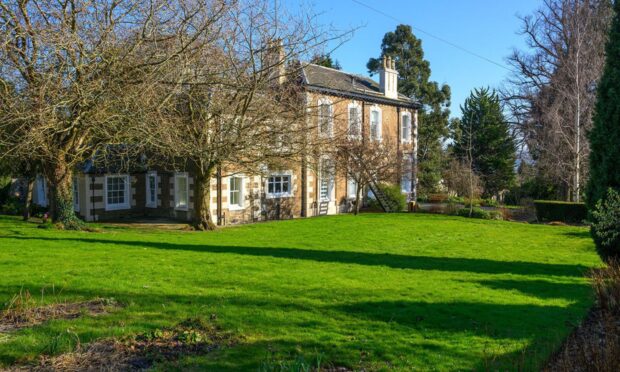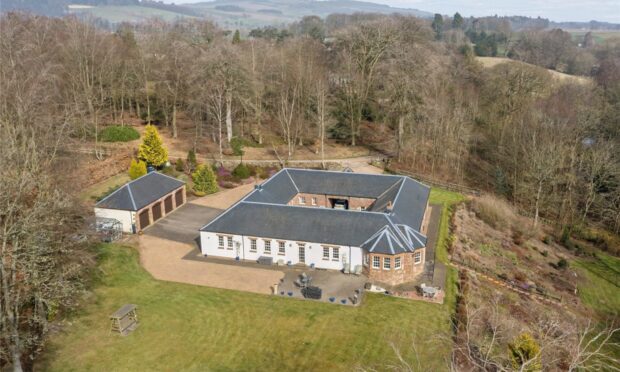When life gets overwhelming, many of us fantasise about downing tools, selling everything and going to live off-grid in some remote spot, away from the rat race.
Most people merely daydream about it, before re-entering the fray and getting on with the daily grind.
But not Liam Chester – a Scottish accountant who suffered burn out when setting up his own firm and decided enough was enough.
Leaving the rat race
The 28-year-old and his partner, 25-year-old book keeper Lauren Henderson, converted a van into a mobile office and living space, which they now use as their base for much of the year.
The couple have travelled to some of the most picturesque parts of the UK, including the Aberdeenshire Coast, the Cairngorms, the Scottish Borders, Arran and the Lake District, with a visit to Tayside planned for the end of the year.
It hasn’t been a complete rejection of the treadmill of modern life – Liam and Lauren still have their house in Coatbridge, and continue to work in their chosen professions.
But having a regular change of scenery, being among nature and setting firm boundaries regarding working hours has done wonders for Liam especially.
Working too much
“When I was working from home I could never just switch off and relax, I was always thinking about work and how to keep the business going”, Liam muses.
“I was getting up at 4am most days and just never stopped – I would carry on working throughout the evenings. I was averaging 80 hours a week and it just wasn’t sustainable.
“It got to the point where my physical and mental health was suffering. I had to go to the doctor and was on medication to help me relax and sleep.
Suffering burnout
“I realised I couldn’t continue to work like this and had to prioritise my mental health.”
Liam and Lauren had already experimented with camper van travel, getting away for occasional weekend breaks.
It was at the end of 2019, just after Liam’s burnout crisis, that the couple decided to go a step further and make it into a semi-permanent lifestyle choice.
Converting a van
They purchased a bigger van and began the arduous task of converting it into a space where they could work and live off-grid for months at a time.
“I’d done some DIY around the house, but never anything like this”, says Liam.
“It was a steep learning curve, as we did everything from scratch. The van was just a shell, it didn’t even have windows. We used lots of YouTube tutorials and did everything ourselves.”
Van life
The van now boasts an impressive array of features. Liam and Lauren have a work station each with laptops and tablets, complete with a wifi system, which involves a router being cabled to an antenna on the van’s roof that links up to satellites.
It allows them to pick up 4G data signal in more places and is more reliable than a mobile phone so they can travel to remote countryside.
There is also a kitchen with a gas hob, a bathroom with a small shower and a chemical toilet, a water pump and a solar panel, as well as beds.
A diesel heater and insulation made from foam and recycled plastic under a wooden floor and wall panels keeps the van warm, while wires behind the walls and ceiling, as well as multiple battery packs and a hybrid inverter keep the electricity flowing.
Remote working
“The van is really comfortable, it’s really just like staying in a small apartment”, adds Liam.
“We do sometimes stay in camp sites, but we also go off grid, I’d say it’s 50-50.
“It really doesn’t matter where we are in terms of work, because our work can be done from anywhere.
“A lot of businesses realised during the pandemic that they could have their staff work remotely, but we were already fully digital even before the lockdown.
“I think remote working offers so many benefits, both to businesses and their employees.
Work-life balance
“For us, we can have a much better work-life balance this way. When we finish work we can go straight out in nature and go for a walk, which really helps us switch off.
“We often bump into holiday makers and chat to them, which makes us feel like we’re on holiday too. It’s been a real game changer and my mental health has improved so much.
“Of course, not everyone will be able to work from a van and not every job can be done remotely, but I hope businesses who are able to do so will continue to allow remote working after the pandemic is over.”
The Sounding Board
Inspired by his own recovery from burnout, Liam felt compelled to share his experience and wisdom with other young entrepreneurs trying to make it in the world of business.
He set up The Sounding Board, a charity to help 16-24-year-old set up their own business while also maintaining a work-life balance.
The charity offers free courses, mentoring, help from a mental health practitioner and practical advice on finance, marketing, admin and taxes.
Young entrepreneurs
“I was only 22 when I set up my business and it was overwhelming trying to do it all myself, so I was in the same position as the young people I mentor now”, reflects Liam.
“I took the plunge and gave up a steady job, and then had to work on every aspect of the business by myself. It was stressful.
“A lot of the young people I mentor are very passionate about their business idea but they need help with the practical side of things, such as how to do their taxes, how to market themselves etc.
Running a business
“It’s also important to teach them how to do it all sustainably and look after their mental health.
“Running a business is difficult and some do fail, but we’re there to be a sounding board, to offer advice and help where we can.”
Does Liam see his van adventure as a permanent lifestyle choice? “Yes, it is something we’ll keep doing for as long as possible”, he enthuses.
“We plan to travel around the UK and then venture further away to France and the rest of Europe. There are so many beautiful places to explore.”
Van Life
Liam and Lauren aren’t alone in craving a freer, simpler life on the road. A quick look under the hashtag #vanlife on Instagram throws up thousands of idyllic photographs complete with sunsets and exotic locations.
There are many Facebook groups and online forums where like-minded people who have adopted this lifestyle, as well as those aspiring to do so, can discuss the practicalities of life on the move and share their stories.
Vehicle maintenance and repairing water pumps, portable cookers and faulty electrics feature often, as well as ideas about space-saving solutions, best places to pitch up and how to earn money while travelling.
Compromises
The overall impression is that whilst this lifestyle offers freedom, the chance to explore different locations and to have fun, it also comes with significant compromises – the obvious ones being lack of space and the logistical issues of not having a permanent base.
Is it a realistic lifestyle choice for the majority? Probably not, but it is certainly doable for those who are determined enough to make it happen and are willing to be adaptable.
As for Liam and Lauren, the couple plan to keep going with their hybrid version of van life. They have no plans to sell their home, which provides a stable base for them, while also maintaining their van in order to have the option to travel.
